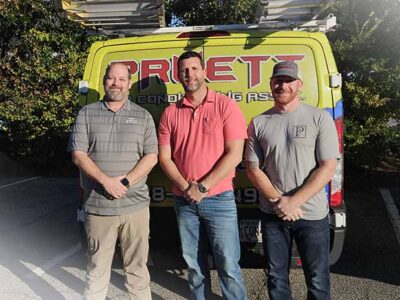
You can save money and keep your Eastman, Georgia, home comfortable by replacing your old heating system with a more efficient model. Furnaces and heat pumps work differently, each coming with different fuel sources, risk factors and costs. Read on to learn about the pros and cons of furnaces and heat pumps, ensuring your choose the right system for your needs.
How Furnaces and Heat Pumps Work
A furnace uses a flame or an electric burner to heat air. A fan then pushes the hot air through your ductwork into all the rooms in your home. In summer, you’ll need a separate air conditioner with an indoor and outdoor unit to keep your family cool.
An electric heat pump is quiet and compact, and it can both heat and cool your home. In summer, it works like an air conditioner to transfer heat from your indoor air outside.
A motorized fan pulls warm air from your home into your ducts through one or more return vents. It then travels to the indoor air handler and passes over the evaporator coil, which contains refrigerant that absorbs heat. The cooled, dehumidified air goes back through your ductwork, and the cycle starts again when the air temperature rises.
In winter, the heat pump reverses the direction in which the refrigerant flows. It changes the coil in the outdoor unit to the evaporator coil. That way, it can absorb heat from the outside air and release it through the condenser coil in the indoor air handler to heat your home.
Fuel Sources
Furnaces use natural gas, propane, wood, coal or electricity, and all heat pumps are electric.
Natural gas is a utility that you receive in your home through a network of underground pipelines. However, it’s only available in some areas.
Propane is similar, but it comes in tanks instead of through pipes. You’ll need to refill your propane tank regularly, and it can take up a significant amount of space in your yard.
Wood or coal stoves or furnaces are reliable, but they’re not as efficient as natural gas or propane. They also lower your indoor air quality by producing smoke and soot.
Electric furnaces are less efficient than gas models, but they’re a quiet, convenient option for people who don’t want to deal with another type of fuel.
Risk Factors
A furnace with a combustible fuel source can increase your risk of fire. Also, partially burned fuel can produce carbon monoxide if the furnace isn’t working correctly. This odorless, colorless gas can replace the oxygen in your home, causing headaches, nausea, dizziness and even death.
If you have a natural gas, propane, wood or coal furnace, your home should have a carbon monoxide detector. If it goes off or you experience unusual symptoms, leave your home and contact a professional.
You should also watch for the smell of smoke or gas from a malfunction, a gas leak, or a wiring problem in an electric furnace or a heat pump.
Costs
A heat pump costs less to install than a furnace and an air conditioner. However, in many areas, natural gas or propane furnaces are worth the extra investment.
Natural gas is inexpensive in most regions, and propane is very efficient. It produces about twice as much heat as natural gas, but it costs more in most areas. Wood and coal are also inexpensive, but the savings usually aren’t worth the extra soot or the effort it takes to refill the furnace or stove.
Pruett Air Conditioning is a Carrier Factory Authorized Dealer with more than 40 years of experience. We can help you install, maintain and repair a variety of HVAC equipment, including heat pumps, furnaces, indoor air quality technology, and more. Call us anytime at 478-953-4986 or 478-374-1481 for excellent service from our friendly service technicians.
Image provided by Shutterstock

